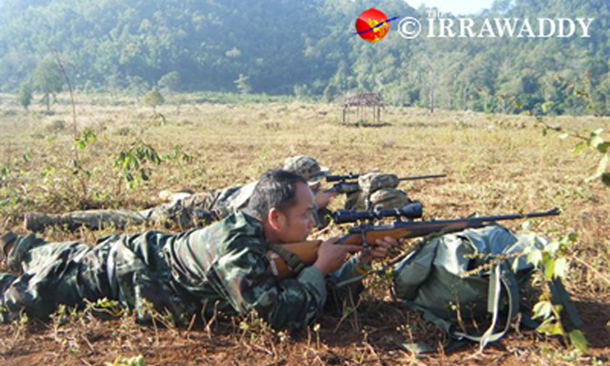In east Burma’s Karen State, hundreds of civilians have fled from their homes as fighting continues between the rebel Democratic Karen Buddhist Army (DKBA) and a government-backed militia, the Karen Border Guard Force (BGF).
The displaced families have left villages near the town of Myaing Gyi Ngu, a former stronghold base of the DKBA where government troops have reportedly been dispatched to curb tensions between the two rival militias.
Zin Zin, a resident in the nearby town of Shwe Gone, said five military trucks filled with armed Burmese soldiers had gone on Thursday to Myaing Gyi Ngu, about 10 miles away.
Some displaced civilians have taken shelter in a monastery in Shwe Gone, while others are staying with relatives in villages near Myaing Gyi Ngu.
“The monastery is full of people,” Zin Zin told The Irrawaddy. “I think there are between 400 and 500 people—they don’t dare to return home now, as tensions remain so high.”
Fighting between the DKBA and the BGF broke out last Friday after DKBA troops in Myaing Gyi Ngu opened fire on a group of BGF soldiers traveling on the Salween River.
Hostilities calmed after the government dispatched troops to the area on Monday and seized about 40 guns from the DKBA, including AK-47 rifles, rocket launchers and ammunition.
However, DKBA spokesman Maj. Saw Wai Htoo told The Irrawaddy on Friday that further fighting was expected if the government and the BGF did not return the weapons, as the DKBA has requested.
He said the joint forces of the BGF and the government army were approaching Mee San base, headquarters of the DKBA’s Klo Htoo Lah battalion, about 7 miles from Myaing Gyi Ngu.
“We estimate they have 300 men,” he said. “They are heading to our headquarters. We have no option but to fight back to protect our headquarters.”
A housewife in the village of Ta Kwe Kee, about five miles from Myaing Gyi Ngu, said the on-and-off conflict between the DKBA and the BGF made life difficult for local residents. She said civilians were fearful of both militias, with the threat of getting killed in a crossfire or being arrested by a militia and forced to work as a porter.
“I’m tired of this [fighting],” she said. “They have guns, so they do whatever they want. We villagers are the ones who suffer.
“If they want to fight, I want them to fight until one group totally beats the other, to end this conflict for good. That way we won’t need to worry about future attacks.”
The conflict has also taken a toll on business owners, including those who run local transportation services. When fighting breaks out, vehicles are frequently seized by both militia forces and used to transport soldiers or weapons.
A truck driver who makes a living transporting people from neighboring Thailand across the border to Myaing Gyi Ngu said DKBA soldiers often forced him to transport soldiers and military supplies. As a result, he said, BGF soldiers were angry and had threatened to attack his car and passengers.
“One time, I was stopped by the BGF at gunpoint,” said the driver, speaking on condition of anonymity for safety concerns. “They told me they would spray my car with bullets. Others said my car will be blown to pieces if I ever carried DKBA soldiers again.”
“I’m a civilian,” he added. “How can I refuse their orders? They have guns. If I don’t obey, they can kill me.”
He said his transportation route was blocked whenever fighting broke out between the two militias, making it difficult for him to continue his business.
In early January, fighting also erupted between the DKBA and the BGF in the Myaing Gyi Ngu area.
The conflict is widely seen as a commercial war, with local civilians saying both sides want control over the region and its roads so they can take taxes from traders.
However, DKBA sources say they are fighting because they oppose a plan by the government to build the Hat Gyi dam on the Salween River near their base.

















